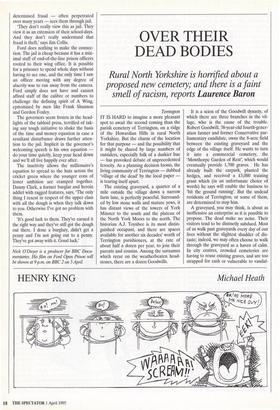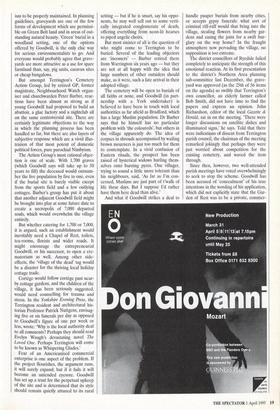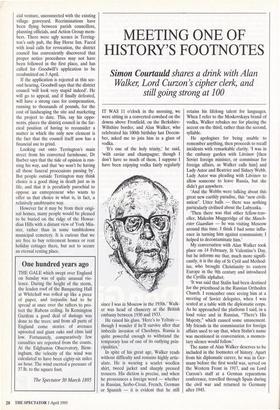OVER THEIR DEAD BODIES
Rural North Yorkshire is horrified about a proposed new cemetery; and there is a faint
smell of racism, reports Laurence Baron Terrington IT IS HARD to imagine a more pleasant spot to await the second coming than the parish cemetery of Terrington, on a ridge of the Howardian Hills in rural North Yorkshire. But the charm of the location for that purpose — and the possibility that it might be shared by large numbers of outsiders, especially folk of a duskier hue — has provoked debate of unprecedented ferocity. As a planning decision looms, the living community of Terrington — dubbed `village of the dead' by the local paper is tearing itself apart.
The existing graveyard, a quarter of a mile outside the village down a narrow farm lane, is perfectly peaceful. Surround- ed by low stone walls and mature yews, it has distant views of the towers of York Minster to the south and the plateau of the North York Moors to the north. The historian A.J. Toynbee is its most distin- guished occupant, and there are spaces available for another six decades' worth of Terrington parishioners, at the rate of about half a dozen per year, to join their parents and cousins. Among the surnames which recur on the weatherbeaten head- stones, there are a dozen Goodwills. It is a scion of the Goodwill dynasty, of which there are three branches in the vil- lage, who is the cause of the trouble. Robert Goodwill, 38-year-old fourth-gener- ation farmer and former Conservative par- liamentary candidate, owns the 8-acre field between the existing graveyard and the edge of the village itself. He wants to turn it into a commercial cemetery, the `Mowthorpe Garden of Rest', which would eventually provide 1,700 graves. He has already built the carpark, planted the hedges, and received a £3,000 training grant which (in an unfortunate choice of words) he says will enable the business to `hit the ground running'. But the undead residents of Terrington, or some of them, are determined to stop him.
A graveyard, you may think, is about as inoffensive an enterprise as it is possible to propose. The dead make no noise. Their visitors tend to be distinctly subdued. Most of us walk past graveyards every day of our lives without the slightest shudder of dis- taste; indeed, we may often choose to walk through the graveyard as a haven of calm. In city centres, crowded cemeteries are having to reuse existing graves, and are too strapped for cash or vulnerable to vandal- ism to be properly maintained. In planning guidelines, graveyards are one of the few forms of development which are permissi- ble on Green Belt land and in areas of out- standing natural beauty. 'Green' burial in a woodland setting, one of the options offered by Goodwill, is the only chic way for serious environmentalists to go. And everyone would probably agree that grave- yards are more attractive as a use for spare farmland than, say, pig units, caravan sites or cheap bungalows.
But amongst Terrington's Cemetery Action Group, led by retired GP, former magistrate, Neighbourhood Watch organ- iser and churchwarden Peter Barber, reac- tions have been almost as strong as if young Goodwill had proposed to build an abattoir, a glue factory and a nightclub all on the same controversial site. There are certainly legitimate objections to the way in which the planning process has been handled so far, but there are also layers of subjective response which are a vivid illus- tration of that most potent of domestic political forces, pure parochial Nimbyism.
The Action Group's most rational objec- tion is one of scale. With 1,700 graves (which Goodwill says will take up to 50 years to fill) the deceased would outnum- ber the live population by five to one, even if the burial site is barely visible except from the sports field and a few outlying cottages. Barber's group has put it about that another adjacent Goodwill field might be brought into play at some future date to create a necropolis of 7,000 departed souls, which would overwhelm the village entirely.
But whether catering for 1,700 or 7,000, it is argued, such an establishment would inevitably need a Chapel of Rest, toilets, tea-rooms, florists and wider roads. It might encourage the entrepreneurial Goodwill, or his successor, to open a cre- matorium as well. Among other side- effects, the 'village of the dead' tag would be a disaster for the thriving local holiday cottage trade.
Cortege would follow cortege past near- by cottage gardens, and the children of the village, it has been seriously suggested, would need counselling for trauma and stress. In the Yorkshire Evening Press, the Terrington resident and architectural his- torian Professor Patrick Nuttgens, envisag- ing five or six funerals per day as opposed to Goodwill's figure of one per week or less, wrote: 'Why is the local authority deaf to all comments? Perhaps they should read Evelyn Waugh's devastating novel The Loved One. Perhaps Terrington will come to be known as Whispering Glades.'
Fear of an Americanised commercial enterprise is one aspect of the problem. If the project flourishes, the argument runs, it will surely expand; but if it fails it will become an untended eyesore. Goodwill has set up a trust for the perpetual upkeep of the site and is determined that its style should remain quietly attuned to its rural setting — but if he is smart, say his oppo- nents, he may well sell out to some verti- cally integrated conglomerate of death, offering everything from neon-lit hearses to piped angelic choirs.
But most sinister of all is the question of who might come to Terrington to be buried. Several of the leading objectors are incomers' — Barber retired there from Warrington six years ago — but they are not at all happy with the idea that large numbers of other outsiders should make, as it were, such a late arrival in their adopted village.
The cemetery will be open to burials of all faiths or none, and Goodwill (in part- nership with a York undertaker) is believed to have been in touch with local authorities as far afield as Bradford, which has a large Muslim population. Dr Barber says that he himself has no particular problem with 'the coloureds', but others in the village apparently do. The idea of corpses in shrouds accompanied by wailing brown mourners is just too much for them to contemplate. In a vivid confusion of Eastern rituals, the prospect has been raised of hysterical widows hurling them- selves onto burning pyres. One villager, trying to sound a little more tolerant than his neighbours, said, 'As far as I'm con- cerned, Muslims are just part of t'walk of life these days. But I suppose I'd rather have them here dead than alive.'
And what if Goodwill strikes a deal to handle pauper burials from nearby cities, or accepts gypsy funerals: what sort of criminal riff-raff would that bring into the village, stealing flowers from nearby gar- dens and casing the joint for a swift bur- glary on the way home? In the fraught atmosphere now pervading the village, no supposition is too extreme.
The district councilors of Ryedale failed completely to anticipate the strength of this emotional reaction. At its first presentation to the district's Northern Area planning sub-committee last December, the grave- yard was approved (as the 25th of 56 items on the agenda) so swiftly that Terrington's own councillor, an elderly farmer called Bob Smith, did not have time to find the papers and express an opinion. John Richardson, editor of the local Gazette & Herald, sat in on the meeting. 'There were longer discussions on satellite dishes and illuminated signs,' he says. Told that there were indicatkins of dissent from Terrington parish council, the chairman of the meeting remarked jokingly that perhaps they were just worried about competition for the existing cemetery, and waved the item through.
Since then, however, two well-attended parish meetings have voted overwhelmingly to seek to stop the scheme. Goodwill has been accused of 'concealment' of his true intentions in the wording of his application, which did not explicitly state that the Gar- den of Rest was to be a private, commer- cial venture, unconnected with the existing village graveyard. Recriminations have been flying between parish councillors, planning officials, and Action Group mem- bers. There were ugly scenes in Terring- ton's only pub, the Bay Horse Inn. Faced with loud calls for revocation, the district council has conveniently discovered that proper notice procedures may not have been followed in the first place, and has called for Goodwill's application to be resubmitted on 3 April.
If the application is rejected at this sec- ond hearing, Goodwill says that the district council 'will look very stupid indeed'. He will go to appeal, and if finally defeated, will have a strong case for compensation, running to thousands of pounds, for the cost of landscaping the site and marketing the project to date. This, say his oppo- nents, places the district council in the far- cical position of having to reconsider a matter in which the only new element is the fact that the council itself now has a financial axe to grind.
Looking out onto Terrington's main street from his converted farmhouse, Dr Barber says that the tide of opinion is run- ning his way, and that 'we won't be having all those funeral processions passing by'. But people outside Terrington may think choice is a good thing in death just as in life, and that it is peculiarly parochial to oppose an entrepreneur who wants to offer us that choice in what is, in fact, a relatively unobtrusive way.
However far it may be from their origi- nal homes, many people would be pleased to be buried on the ridge of the Howar- dian Hills with a distant view of York Min- ster, rather than in some tumbledown municipal cemetery. It is curious that we are free to buy retirement homes or rent holiday cottages there, but not to secure an eternal resting place.




























































 Previous page
Previous page